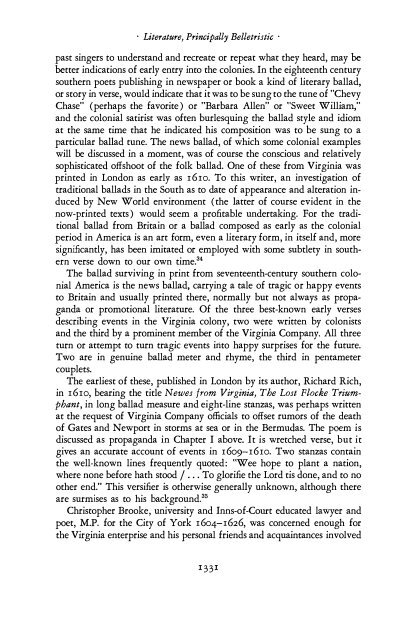Literature, Principally Belletristic - University of Tennessee, Knoxville
Literature, Principally Belletristic - University of Tennessee, Knoxville
Literature, Principally Belletristic - University of Tennessee, Knoxville
You also want an ePaper? Increase the reach of your titles
YUMPU automatically turns print PDFs into web optimized ePapers that Google loves.
· <strong>Literature</strong>, <strong>Principally</strong> <strong>Belletristic</strong> .<br />
past singers to understand and recreate or repeat what they heard, may be<br />
better indications <strong>of</strong> early entry into the colonies. In the eighteenth century<br />
southern poets publishing in newspaper or book a kind <strong>of</strong> literary ballad,<br />
or story in verse, would indicate that it was to be sung to the tune <strong>of</strong> "Chevy<br />
Chase" (perhaps the favorite) or "Barbara Allen" or "Sweet William,"<br />
and the colonial satirist was <strong>of</strong>ten burlesquing the ballad style and idiom<br />
at the same time that he indicated his composition was to be sung to a<br />
particular ballad tune. The news ballad, <strong>of</strong> which some colonial examples<br />
will be discussed in a moment, was <strong>of</strong> course the conscious and relatively<br />
sophisticated <strong>of</strong>fshoot <strong>of</strong> the folk ballad. One <strong>of</strong> these from Virginia was<br />
printed in London as early as 1610. To this writer, an investigation <strong>of</strong><br />
traditional ballads in the South as to date <strong>of</strong> appearance and alteration induced<br />
by New World environment (the latter <strong>of</strong> course evident in the<br />
now-printed texts) would seem a pr<strong>of</strong>itable undertaking. For the traditional<br />
ballad from Britain or a ballad composed as early as the colonial<br />
period in America is an art form, even a literary form, in itself and, more<br />
significantly, has been imitated or employed with some subtlety in southern<br />
verse down to our own time.34<br />
The ballad surviving in print from seventeenth-century southern colonial<br />
America is the news ballad, carrying a tale <strong>of</strong> tragic or happy events<br />
to Britain and usually printed there, normally but not always as propaganda<br />
or promotional literature. Of the three best-known early verses<br />
describing events in the Virginia colony, two were written by colonists<br />
and the third by a prominent member <strong>of</strong> the Virginia Company. All three<br />
turn or attempt to turn tragic events into happy surprises for the future.<br />
Two are in genuine ballad meter and rhyme, the third in pentameter<br />
couplets.<br />
The earliest <strong>of</strong> these, published in London by its author, Richard Rich,<br />
in 1610, bearing the title Newes from Virginia} The Lost Plocke Triumphant,<br />
in long ballad measure and eight-line stanzas, was perhaps written<br />
at the request <strong>of</strong> Virginia Company <strong>of</strong>ficials to <strong>of</strong>fset rumors <strong>of</strong> the death<br />
<strong>of</strong> Gates and Newport in storms at sea or in the Bermudas. The poem is<br />
discussed as propaganda in Chapter I above. It is wretched verse, but it<br />
gives an accurate account <strong>of</strong> events in 16°9-1610. Two stanzas contain<br />
the well-known lines frequently quoted : "Wee hope to plant a nation,<br />
where none before hath stood / . .. To glorifie the Lord tis done, and to no<br />
other end." This versifier is otherwise generally unknown, although there<br />
are surmises as to his background.3s<br />
Christopher Brooke, university and Inns-<strong>of</strong>-Court educated lawyer and<br />
poet, M.P. for the City <strong>of</strong> York 1604-1626, was concerned enough for<br />
the Virginia enterprise and his personal friends and acquaintances involved<br />
1331















